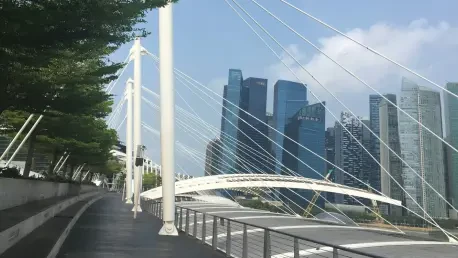The People’s Action Party (PAP) is currently preparing for the 2025 General Election by introducing a new and diverse slate of candidates. With the aim of forming the fifth-generation (5G) leadership of the party, PAP focuses on enhancing political and social diversity among its leadership team. This introduction aims to strengthen the involvement of various ethnicities and professional backgrounds, ensuring that the leadership resonates more effectively with a broader spectrum of voters. The strategic inclusion of minority candidates and professionals from diverse sectors signifies a pivotal shift in PAP’s political landscape, aiming for more sustainable and inclusive governance.
Diversity in Leadership
PAP is showcasing a more ethnically and professionally diverse group of candidates compared to previous elections. This move reflects a deliberate strategy to introduce a multifaceted leadership team that can resonate with a broader spectrum of voters. Including more candidates from minority backgrounds is a key feature in this new slate. Prominent individuals of Malay and Indian descent are positioned to ensure better representation within the party’s core leadership. By doing so, PAP aims to create a leadership team that mirrors the multicultural fabric of Singaporean society, thus addressing the need for more inclusive and representative governance.
The focus on diversity is not just limited to ethnicity; it also encompasses professional diversity. The new set of candidates includes individuals from varied professional backgrounds, which signifies PAP’s understanding of the importance of having leaders who bring different perspectives and expertise. This diversity helps in creating a leadership team that is equipped to tackle a wide range of contemporary policy challenges. By aligning the leadership more closely with the diverse population of Singapore, PAP ensures that its governance style remains relevant and effective in addressing the evolving needs of its citizens.
Professional Backgrounds
The diversity extends beyond ethnic lines, with the inclusion of candidates from varied professional backgrounds. Unlike past trends that heavily favored civil service and military careers, the new candidates come from sectors such as trade, health, finance, and digital development. This shift signifies PAP’s acknowledgment of the need for a leadership team with wide-ranging professional experiences that can address contemporary policy challenges effectively. Such a move underscores the party’s commitment to evolving its leadership composition to better align with the changing landscape of Singapore’s socio-economic environment.
The introduction of candidates from non-traditional sectors also brings fresh perspectives into the political dialogue. These professionals, with their expertise in areas crucial to modern governance, are expected to contribute innovative solutions to complexities faced by Singapore. The inclusion of professionals from health and digital development, for instance, highlights the party’s proactive approach to address crucial sectors of public interest. By integrating individuals with such diverse professional backgrounds, PAP aims to foster a more dynamic and adept leadership, capable of navigating Singapore through future challenges efficiently.
Succession Planning
PAP emphasizes long-term succession planning by introducing these young candidates early in their political careers. The strategy ensures that they gain essential governance experience to meet future demands. Prime Minister Lawrence Wong has emphasized the importance of these candidates, indicating that many will rapidly ascend to significant political positions if elected. This anticipatory approach is vital for ensuring that the future leaders are well-prepared and seasoned by the time they are required to take up more significant roles within the government.
Historically, PAP has implemented a cyclical pattern of renewal, with significant emphasis on succession planning, training, and exposure to political roles early on. The current slate of candidates follows this trajectory, representing the party’s long-standing commitment to nurturing future leaders. However, the pronounced focus on diversity sets this cycle apart, demonstrating an evolved strategy that incorporates lessons from past experiences while adapting to contemporary social dynamics. This deliberate inclusion of younger candidates aims to build a robust and adaptable leadership pipeline, ensuring the party’s resilience in an ever-changing political landscape.
Historical Pattern of Renewal
PAP’s candidate renewal strategy is not new, echoing past electoral patterns where fresh faces were introduced to rejuvenate the party. Each decade has seen a cadre of new candidates poised to take on high-ranking roles. A key difference in the 2025 elections is the pronounced focus on engaging more diverse and younger candidates, ensuring that the party stays relevant to Singapore’s evolving demographic landscape. This strategy aims to align the party’s leadership more closely with the younger generation of voters and the growing multicultural population, fostering a sense of representation and inclusion.
Moreover, the strategy of renewal has consistently included bringing in candidates who show potential for high-ranking political roles. These candidates are often individuals who have demonstrated exceptional leadership qualities in their respective fields. The introduction of a diverse slate in the current elections continues this trend, with an added emphasis on attracting candidates from non-traditional sectors. This approach ensures that the leadership body is not only diverse but also highly competent, capable of addressing the complex and multifaceted needs of Singapore’s populace.
Reflecting Current Leadership Trajectories
Interestingly, the career paths of these new candidates reflect those of current Cabinet members. Figures like Jeffrey Siow and David Neo have professional journeys that parallel prominent leaders such as PM Wong and former Chief of Army Chan Chun Sing. These similarities indicate a well-thought-out plan to continue the legacy of successful leadership while adapting to new challenges in governance. By selecting candidates whose professional experiences mirror those of current leaders, PAP is ensuring a seamless transition and continuity in its governance philosophy.
Such strategic alignment also serves to maintain the high standards of governance established by predecessors while infusing new energy and perspectives into the leadership. The inclusion of individuals who have followed similar career trajectories ensures that the core values and strategic approaches that have historically guided the party’s policies are preserved. This continuity, coupled with the introduction of fresh ideas from diverse backgrounds, is expected to enhance the party’s ability to govern effectively and address emerging issues innovatively.
Trends in Diversity and Inclusion
PAP’s inclusion of minority candidates and individuals from community-centric roles highlights its commitment to representing a broader cross-section of Singaporean society. This effort aims to address gaps in minority representation and include voices from beyond traditional elite circles. By integrating professionals deeply involved in community work, PAP hopes to bring fresh perspectives and address grassroots-level concerns more effectively. This strategy not only enhances the party’s appeal to a wider voter base but also ensures that the leadership is more attuned to the needs and aspirations of common citizens.
The deliberate inclusion of community-focused professionals demonstrates PAP’s recognition of the importance of grassroots engagement and the need to address the everyday concerns of the populace. These candidates are expected to bring practical insights into governance, making policies more relatable and impactful at the ground level. By broadening the scope of representation, PAP ensures that its policies are informed by a diverse range of experiences and perspectives, thus fostering more inclusive and equitable governance.
Importance of Early Exposure
Political analysts suggest that early exposure to governance roles is crucial for handling voter demands and complex policy environments. Candidates being prepped for significant future roles ensures they are well-equipped to navigate Singapore’s intricate political landscape. Institute of Policy Studies’ Gillian Koh underscores the necessity of this training, indicating that the inclusion of younger candidates ensures the party’s sustainability through at least two to three election cycles. This long-term approach to leadership development is essential for maintaining the party’s relevance and effectiveness in a rapidly changing world.
Early exposure not only equips candidates with the necessary skills to manage governance challenges but also familiarizes them with the intricacies of political life. This experience is invaluable in building leaders who are resilient, adaptable, and capable of making informed decisions under pressure. By integrating this strategic training into their political journey, PAP ensures that its leaders are well-prepared to handle the demands of public office and contribute meaningfully to the nation’s progress.
Conclusion
The People’s Action Party (PAP) is gearing up for the 2025 General Election by presenting a new and diverse slate of candidates. Their goal is to shape the fifth-generation (5G) leadership within the party, underlining the importance of increased political and social diversity in their ranks. This effort aims to boost representation from various ethnic and professional backgrounds within its leadership team. By doing so, PAP intends to better connect with a broader range of voters. The strategic inclusion of minority candidates and professionals from different sectors marks a significant shift in PAP’s political approach. This move underscores their commitment to sustainable and inclusive governance. PAP’s intention is to create a more dynamic and representative leadership that can address contemporary societal needs and effectively engage with Singapore’s diverse population. This initiative reflects an understanding that diversity within leadership can lead to more robust and holistic decision-making that benefits the entire community.









